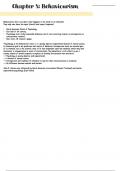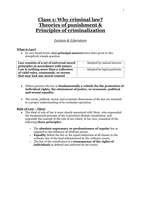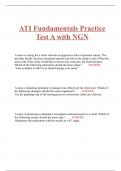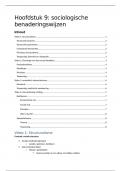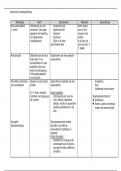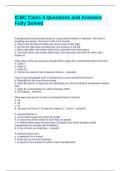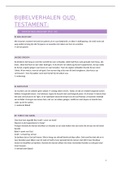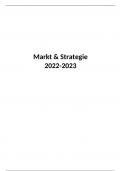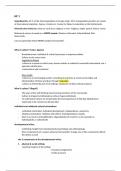Chapter 5: Behaviourism
Behaviourists don’t care about what happens in the inside of an individual
They only care about the input (stimuli) and output (response)
• North American School of Psychology
• First half of XX century
• Psychology must study measurable behaviour and it must avoid any interest on introspection or
consciousness contents.
• Born from J.B. Watson’s paper
”Psychology as the behaviourist views it, is a purely objective experimental branch of natural science.
Its theoretical goal is the prediction and control of behaviour. Introspection forms no essential part
of its methods, nor is the scientific value of its data dependent upon the readiness which they lend
themselves to interpretation in terms of consciousness. The behaviourist, in his efforts to get a
unitary scheme of animal response, recognises no dividing line between man and brute”
—> Psychology is purely objective and experimental
—> A branch of natural science
—> Introspection and readiness of individual to tap into their unconsciousness is irrelevant
—> No difference between animals and humans
John B. Watson was influenced by North American structuralism (Edward Titchener) and animal
experimental psychology (Ivan Pavlov)
, Ivan Petrovij Pavlov (1849-1936)
• Same time as Wundt in Germany
• In Russia, psychology interest was focused on the experimental study of the physiology of nervous
system (objective psychology)
• Based mainly on animal experiments
- First was Bechterev: he paired a buzz to a later electric shock. After a few repetitions, dogs learned
to remove their leg when heard the buzz. This was called associated motor reflex.
• Ivan Pavlov's research involved studying dogs' salivary glands, primarily focused on their digestive
processes. By using food to activate the dogs' salivation response, he made an intriguing observation.
The dogs began salivating not only when they encountered food-related stimuli but also when
exposed to unrelated cues, like the sound of a bell or a metronome, leading to a major discovery in
his experiments.
• Pavlov's research showed that dogs learned to associate the bell's sound with food through repeated
pairings. This meant that the dogs would start salivating when they heard the bell, even without
food. This discovery forms the basis of classical conditioning, where unrelated stimuli become linked,
causing specific responses, even in the absence of the original stimulus. (—> psychic segregation —>
conditioned reflex)
Classical conditioning
• Unconditional: not depending on any previous condition (food produces a proper response and
salivation appears automatically) —> natural reaction comes automatically
• Conditional: depends on previous existence of a stimuli (salivation depends on previous association
with bell) —> natural reaction has to be forced
• Unconditioned stimulus
• Unconditioned response
• Conditioned stimulus
• Conditioned response
Behaviourists don’t care about what happens in the inside of an individual
They only care about the input (stimuli) and output (response)
• North American School of Psychology
• First half of XX century
• Psychology must study measurable behaviour and it must avoid any interest on introspection or
consciousness contents.
• Born from J.B. Watson’s paper
”Psychology as the behaviourist views it, is a purely objective experimental branch of natural science.
Its theoretical goal is the prediction and control of behaviour. Introspection forms no essential part
of its methods, nor is the scientific value of its data dependent upon the readiness which they lend
themselves to interpretation in terms of consciousness. The behaviourist, in his efforts to get a
unitary scheme of animal response, recognises no dividing line between man and brute”
—> Psychology is purely objective and experimental
—> A branch of natural science
—> Introspection and readiness of individual to tap into their unconsciousness is irrelevant
—> No difference between animals and humans
John B. Watson was influenced by North American structuralism (Edward Titchener) and animal
experimental psychology (Ivan Pavlov)
, Ivan Petrovij Pavlov (1849-1936)
• Same time as Wundt in Germany
• In Russia, psychology interest was focused on the experimental study of the physiology of nervous
system (objective psychology)
• Based mainly on animal experiments
- First was Bechterev: he paired a buzz to a later electric shock. After a few repetitions, dogs learned
to remove their leg when heard the buzz. This was called associated motor reflex.
• Ivan Pavlov's research involved studying dogs' salivary glands, primarily focused on their digestive
processes. By using food to activate the dogs' salivation response, he made an intriguing observation.
The dogs began salivating not only when they encountered food-related stimuli but also when
exposed to unrelated cues, like the sound of a bell or a metronome, leading to a major discovery in
his experiments.
• Pavlov's research showed that dogs learned to associate the bell's sound with food through repeated
pairings. This meant that the dogs would start salivating when they heard the bell, even without
food. This discovery forms the basis of classical conditioning, where unrelated stimuli become linked,
causing specific responses, even in the absence of the original stimulus. (—> psychic segregation —>
conditioned reflex)
Classical conditioning
• Unconditional: not depending on any previous condition (food produces a proper response and
salivation appears automatically) —> natural reaction comes automatically
• Conditional: depends on previous existence of a stimuli (salivation depends on previous association
with bell) —> natural reaction has to be forced
• Unconditioned stimulus
• Unconditioned response
• Conditioned stimulus
• Conditioned response

